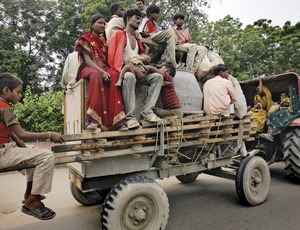
Located 15 miles to the south of India's capital, New Delhi, the city of Gurgaon, barely a town two decades ago, is now the symbol of India's new growth and power.
"Gurgaon has witnessed huge land and economic development," says Punit Sethi, a practicing architect and partner at IAD studio, chairman of the Gurgaon Centre of the Indian Institute of Architects and a resident of Gurgaon. "It is fast becoming a city with towering skylines, modern buildings, malls, call centers, speeding SUVs, high real estate prices, and a place for the rich and famous." However, the city still lacks a working sewer or drainage system, a reliable electricity or water supply, public sidewalks, adequate parking spaces or any form of reliable public transportation.
"A town that is devoid of any natural resource, Gurgaon began capitalizing on its only resource—land," says Sethi. "The town-planning policies of the state allowed development of land by private players in a magnitude not witnessed thus far in most parts of the country. This was the main attraction and magnet for people to move to Gurgaon."
On one hand, this up-and-coming city is home to influential people and companies. On the other, a lack of proper planning and facilities could potentially render it paralyzed. In India, experts and sources say, growth happens through the private sector, and any world-class cities that are emerging are being created not because of the government but in spite of it.
Lack of Infrastructure
Despite the economic growth, the living conditions are poor. According to a recent study by the public interest group Centre for Science and Environment, New Delhi, the water that Gurgaon's residents drink and use for bathing and cooking is contaminated with sewage. Flushed onto open lands, the sewage is allowed to seep into the ground and mix with the groundwater that residents draw out of the bore wells. The CSE study called it "a city drowning in its own excreta."
That's not all. Local activists say the water table is falling as much as 10 feet a year. Power outages for hours on end are fairly common. The police are understaffed, and crime is on the rise. But new projects and construction continue. To deal with the lack of infrastructure, residents and private companies have come up with their own solutions: massive diesel generators that can power entire apartment buildings for days, private bore wells for water and a huge number of taxis, which take the place of public transportation.
"Companies like Microsoft, Nokia, Coke, Oracle and IBM have built housing colonies or apartments for workers that have any amenity you would want in a developed country, including generators, constant running water, luxury accommodation and high-tech offices with excellent internet connectivity," says a South Asia researcher at Exclusive Analysis, a firm that forecasts commercial risks and opportunities around the world. "American-style malls have come up for expats to shop in [and carry] all international brands. While this makes Gurgaon a more expensive city to live in if you're Indian, expats feel right at home."
Eventually, these two extremes—a city that is growing at a furious pace while slow to build up its infrastructure—will culminate in big problems, say analysts. "The scenario of Gurgaon today must be looked into within a framework that includes the protection of natural and historical values and their sustainability as economic, social and administrative entities," says Sethi. "This requires that every action toward urban planning be put into effect with a view to [maximizing] public interest."
Despite its flaws, Gurgaon continues to attract international companies and people. "The bottom line," says the Exclusive Analysis specialist, "is that India remains too lucrative a market for international firms to avoid on the basis of having poor infrastructure."

Post a comment to this article
Report Abusive Comment